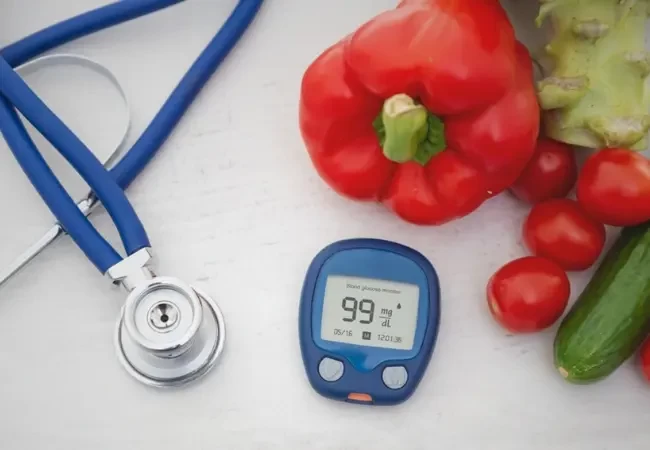Blog
Diabetes
& Eyes

5 Ways Diabetes Can Affect Your Eyes
 Medically reviewed by: Dr. Tom Babu, Consultant Diabetologist & Endocrinologist - Written by Jasni Salim - Updated on 03/09/2024
Medically reviewed by: Dr. Tom Babu, Consultant Diabetologist & Endocrinologist - Written by Jasni Salim - Updated on 03/09/2024Diabetes is rapidly becoming a major health problem in India which exceeds 72 million mentioned cases. Recently in 25 years, various diabetes cases have gone up by 64% in the nation. It is predicted to double by the year 2025. About eight million people in India have vision problems, and 80% of these may be cured or avoided. However, diabetes-associated eye diseases are the main cause of blindness in human beings of the age range 20 to 55. Read till the end to know about diabetes affecting eyes in detail.
Why Does Diabetes Affect Your Eyes?
Three types of diabetes are there which are type 1, type 2, and gestational diabetes. Insulin is not used by the body properly in all these types. Insulin is a hormone that helps take glucose (sugar) to the body's cells where it is used for energy. If too much glucose remains in the bloodstream due to poor work of insulin, it may harm nerves and blood vessels.
For this reason, over time these structures may become weakened around the retina, the part of the eye that detects light signals. When retinal problems are not detected and treated early enough, they can cause bleeding from ruptured vessels within this tissue leading to severe complications such as blindness.
How Does Diabetes Affect the Eyes?
Diabetes is a tough condition in which the pancreas will not make enough insulin which causes high levels of sugar in the blood. There should be insulin in the body to turn sugar into energy. Without enough insulin, it can affect different parts of your eyes like the retina, lens, vitreous, and optic nerve.
When you get high blood sugar from diabetes, it directly affects your eyes and vision. It can alter fluid levels and cause tissue swelling which will lead to blurry vision. This can also make your vision blurry in the short term until your glucose levels get back to normal.
If your glucose levels stay high for a long time, it can harm the blood vessels at the back of your eyes. This can cause leaking of fluid or blood and swelling. Doctors often diagnose this problem in the prediabetes stage, when your glucose levels are higher than normal but not high enough to cause harm. The damaged blood vessels are replaced by weak ones that can bleed into the center of your eye which results in scarring or very high pressure inside your eyes, which can cause more harm.
Have a look at the five ways diabetes affecting eyes.
- Blurred Vision
High blood sugar levels can lead to blurry vision because they cause fluid to build up in the lens of the eye. This fluid build up happens because too much sugar makes the lens fibers swell and change shape. Regulating blood sugar can help correct this in the short term. However, uncontrolled blood sugar can cause permanent changes in your ability to see clearly.
- Cataracts
Diabetics are 60% more likely to develop cataracts, which is when the lens of the eye becomes cloudy. People with diabetes are also more likely to get cataracts at a younger age and have the disease progress faster. Cataract surgery involves replacing the cloudy lens with a clear artificial one.
- Glaucoma
If you have diabetes, you are more than twice as likely to develop glaucoma, a condition that damages the optic nerve and can lead to permanent vision loss. Early diagnosis is important because symptoms usually do not appear until some vision loss has occurred.
- Diabetic Retinopathy
This is the most common cause of vision loss in people with diabetes. It occurs when high blood sugar levels damage the tiny blood vessels in the retina. These damaged vessels can leak fluid or blood into the eye which causes vision distortion. In the early stages, there are usually no symptoms, and by the time symptoms appear, some vision loss may have already occurred. The longer someone has diabetes, the greater the risk of developing this condition. Early diagnosis is key for better outcomes.
- Diabetic Maculopathy
This is a type of diabetic retinopathy that affects the macula, the area of the eye responsible for central vision. It occurs when blood vessels leak protein into the macula, which leads to a build-up of fluid.
How Often Should Someone with Diabetes Get Their Eyes Checked?
Symptoms of eye problems in diabetes often do not show up early. But it is important to get regular eye check-ups, especially if you have diabetes. When symptoms do appear, they might include:
- Wavy or blurry vision
- Vision loss or dark areas
- Frequently changing vision
- Dark strings or spots
- Poor color vision
- Light Flashes
How Can You Take Care of Your Diabetic Eyes?
You can do the following to take care of your diabetic eyes.
- Getting your eyes checked thoroughly by a professional once a year is important.
- Eat the right foods and take your prescribed medicines to control your blood sugar levels.
- Keep your cholesterol and blood pressure under control to protect your eyes.
- Avoid smoking and limit how much alcohol you drink.
- Stay active by including exercise in your daily life.
Remember, if you have diabetes, taking good care of yourself and spotting any eye problems early can help you manage your symptoms and protect your vision.
Conclusion
If you read this article completely, you will know everything about how does diabetes affect the eyes and how to take care of it at that time. You might find different eye conditions related to diabetes like glaucoma, cataracts, etc. You should take action immediately if you start finding these eye conditions.
Silverline Hospital is the best choice to treat your eye conditions related to diabetes. We are experts in caring for eyes affected by diabetes. Our team is skilled in diagnosing and treating these conditions. We offer full eye care like regular eye check-ups and advanced diabetes treatments. At Silverline Hospital, we understand the importance of managing diabetes-related eye problems. We are dedicated to helping patients maintain good vision and overall eye health.

More Blogs
-

Struggling with Erection or Early Ejaculation? Here's How to Get Help
Struggling with erectile dysfunction or premature ejaculation? Learn common causes, treatments, and how to seek professional help with confidence.
-

When Should Diabetics Eat? Expert Tips on Meal Timing and Blood Sugar Control
Learn how diabetics can optimize meal timing to better control blood sugar. Expert tips for healthier, more balanced living.
-

Facing the Fear: Understanding Psychological Erectile Dysfunction Before Marriage
Discover the causes and solutions for psychological erectile dysfunction before marriage. Gain insight, support, and confidence for a healthy relationship.
-

Why Overweight Individuals Should Embrace Early Dinners
Ready to lose weight smarter? See why early dinners are a game-changer for overweight individuals aiming for lasting health and weight control.
-

Overweight? Start with This One Powerful Lifestyle Change
Struggling with weight? Most of us eat our heaviest meal of the day at night, usually after 9 or even 10 PM.


 Home
Home  Booking
Booking
 Chat Now
Chat Now  Call Us
Call Us